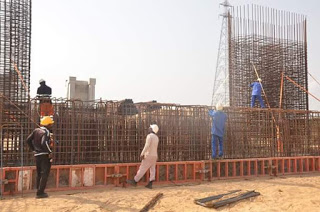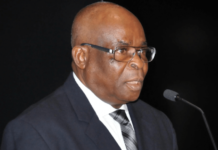 |
| Second Niger Bridge under construction by the Nigerian government |

Dwight Eisenhower’s tenure as President of the United States of America between 1952 and 1962 saw him commission the Lake Pontchartrain Causeway, a bridge which, for several decades, occupied an enviable position as the longest bridge in the world until 2011 when a longer bridge was commissioned in China.
Although the Lake Pontchartrain Causeway was conceived and commissioned by the administration of Eisenhower, it was upgraded by successive leaders, most notable of them being President Lyndon Johnson who completed its second span in 1969.
The point of this analogy, is the simple fact that for sustained progress and development, government ought to be continuum as the inherent limitation of four years (or eight in the case of reelection) imposed by democracy means that leaders, with long term goals for success and beneficial projects which may go beyond their tenure, will have to rely on their successors to buy into their plan and continue its execution for public good. This point is further manifested by the fact that while President Eisenhower was a democrat, Lyndon was a Republican. But they were both united by the cause to ensure good management of resources and delivery of efficient public service.
We have seen other manifestations of this in Africa with, for example, the 6th October bridge in Cairo which began under the watch President Gamal Abdel Nasser but was commissioned 30 years after in 1996.
Similarly, in Nigeria the Mambilla Power Project in conceived in 1972, but stalled due to peculiar challenges such as abandonment and lack of will has been rejuvenated under the present administration of President Muhammadu Buhari who has committed resources to the project, and is now set for commission in six years.
The criticism over the continuation of project as opposed to initiating new ones to claim “ownership” and or show “innovation” stems out of ignorance and is in fact one of the contributory factors to the infrastructure deficit Nigeria is grappling with.
There are several instances of beneficial projects, which were started with billions of tax payers’ money and resources from revenue, being abandoned upon the change of government for childish and sinister political reasons which, ultimately, put the public at a loss. A good example is the Lagos-Ibadan expressway, one of the busiest highways in Africa, which has witnessed several false starts but no completion. The road has claimed several lives and continues to present poor experience to its users.
Nigeria has missed, and continues to miss, several opportunities to enjoy full benefits of meaningful policies and projects owing to its bitter politics which compels new government to completely ignore, irrespective of turnover or prospect, affairs of the previous government. In this regard, President Buhari and his insistence on building on the past to create sustainable growth is a breath of fresh air, and he deserves commendation.
It makes no sense to duplicate on embark on the imitation of new projects when similar or previous ones, initiated with public funds, lie uncompleted. We must disabuse our minds and refuse to be poisoned by childish politics.
Ademuyiwa Adebola Taofeek writes from Lagos. Tweet to him @iam_ademuyiwa










